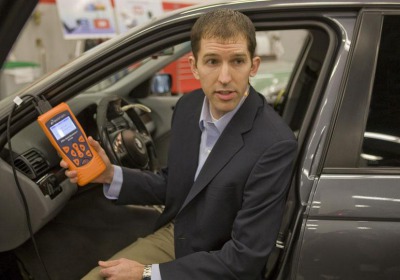Toyota: Fixes are working on recalled vehicles
Tue, 09 Mar 2010
Toyota maintains that the fixes being made to correct unintended acceleration in millions of recalled vehicles are sufficient.
But at a press event Monday, company officials said they are willing to bring in as many independent researchers as needed to resolve the issue once and for all.
“We don't think there is a ghost issue out there,” said Kristen Tabar, general manager of electronic systems at the Toyota Technical Center in Ann Arbor, Mich.
But she conceded that “we need to verify claims, facts and evidence."
“Until we do that, we can't say there is nothing,” she said.
Toyota has recalled nearly 6 million vehicles in the United States to fix both sticky pedals and floor mats that could trap an accelerator and hold it open.
The company said those faults account for the incidents of unintended acceleration.
In a demonstration at the news conference, Toyota sought to debunk a claim made by Southern Illinois University professor David Gilbert that the problem could be electronic.
Gilbert, who testified before a congressional committee last month, has said that in an experiment he was able to cause a vehicle to surge forward without a fault code being generated for an onboard computer Toyota has designed as a safeguard.
Debunking a simulation
Chris Gerdes, director of the Center for Automotive Research at Stanford University, said Monday that Gilbert's demonstration was merely a “simulation,” and did not represent a real world scenario.
He said Gilbert had essentially "rewired" Toyota's accelerator system to generate his results.
To prove that, Toyota hired the engineering firm Exponent, of Irvine, Calif., to conduct the same test on a BMW 325i, a Subaru Outback and a Ford Fusion. Each of the cars showed unwanted acceleration tendencies, but Toyota said no defects were found in the cars.
“You cannot rewire a circuit and expect it to behave as it was designed to,” Gerdes said.
Gerdes, an associate professor of mechanical engineering at Stanford, is an advocate of electronic systems in vehicles. He said systems such as electronic stability control helped reduce vehicle deaths from 41,000 in 2007 to 37,000 deaths in 2008. But he said there should be more exhaustive tests on the electronics of Toyota vehicles.
“I don't want to go on the record saying there is not a problem with Toyota,” he said. “I have not studied the matter that well.”
Tabar said Toyotas are put through vigorous testing in all conditions.
“We put them under severe testing,” she said. “Based on all that, we feel confident it is not electronic. But we have to take every claim seriously.
“Based on all the data we have, we shouldn't see what we're seeing,” she said. “So we need to gather more info. These are complex machines, and we have fail-safe mechanisms.”
Warning signals
In Toyota's vehicles, Tabar said several warning signals occur if the electronic control module detects a problem with the pedal and or the throttle. She said an engine light warning comes on, acceleration is reduced and the vehicle goes into the limp-home mode, or else the engine shuts down completely.
But Toyota has given Exponent the go-ahead to continue studying the matter.
“We are working 24/7 to see if we can find any fault in the system,” said Subodh Medhekar, principal engineer at Exponent. “To date, we have not found anything. We are looking at software, electronics--nothing has been spared. We are doing our damned best to figure it out.”
Some Toyota owners have said their cars continue to show signs of unintended acceleration even after they've been repaired. Toyota spokesman Mike Michels said most of those complaints were due to improper repairs.
He said: “We remain confident if done properly, the fix is effective.”
By Kathy Jackson- Automotive News

